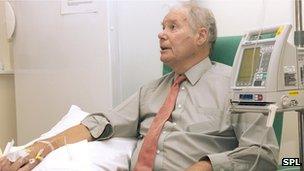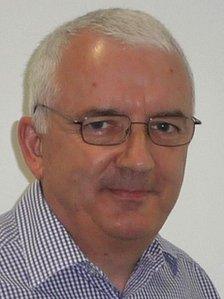A&E cancer diagnosis: Your stories
- Published

Almost a third of cancers in the over-70s are only diagnosed when a patient is admitted to A&E
A study suggests almost a third of cancers in the over-70s are diagnosed only when a patient is admitted to hospital as an emergency.
The National Cancer Intelligence Network looked at nearly 750,000 patients' experiences between 2006-08 in England.
Here, BBC News website readers reveal their experiences of discovering such shocking news.
Julie Parkes, York
My father's brain cancer was only detected after numerous visits to A&E where initially he kept being dismissed as suffering from age-related dementia.
He was sent home despite us telling them that he had been able to hold a conversation a few days earlier and was able to drive.
He subsequently took a fall and suffered a head injury and was placed in an A&E holding ward for scans and an MRI to be done, these quickly found the mass and sadly he died three weeks later.
I think too many elderly people are being dismissed as having age-related dementia without further checks being done.
I have to say that once diagnosed the family couldn't praise the hospital enough for dad's care in his final days.
Peter Bowden, Warrington

This very thing happened to my 75-year-old mother.
We, my sister and I, took my mother to the doctors on a Friday due to our concerns about her mobility and general health; the doctor sent her home with a request to come back the following week for blood tests.
The very next day my mother was admitted to A&E with a pulmonary embolism, probably caused by her poor mobility.
This mobility was almost certainly a result of advanced ovarian cancer, which was very quickly diagnosed once she was admitted to A&E.
Our mother died seven months later; the cancer was so far advanced that surgery was not an option.
Julia, Somerset
My 82-year-old fit and healthy father complained to his doctor on numerous occasions that his stomach hurt. He was losing weight and had also gone off meat.
The doctor told him to drink orange juice and also said it was the remnants of a cold, my father also had a routine blood test.
I finally persuaded him to come and stay with us for a weekend in Somerset. When I saw how little he ate and how much pain he was in I took him to A&E.
He was diagnosed with advanced stomach cancer and died three months later.
I know he was old, but he was active and if the cancer was caught in time we may have had a few more years with him.
- Published21 September 2012